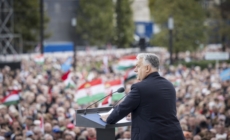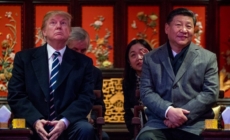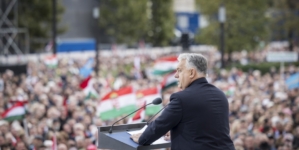PM Viktor Orbán and Donald Trump
The latest U.S. sanctions against Russia have not yet come into effect, so they do not yet represent any kind of disruption to Hungary’s energy supply, but the government is monitoring the situation, Foreign Minister Péter Szijjártó said on Monday in Budapest.
The minister, responding to a recent statement by U.S. Ambassador to NATO Matt Whitaker at a joint press conference with his Israeli counterpart Gideon Saar, emphasized that U.S. sanctions affecting the Russian energy sector have not yet come into force, and therefore do not represent any kind of loss for Hungary. Prime Minister Viktor Orbán will be able to consult with President Donald Trump in person on this issue during his visit to the United States next week, if necessary, after analyzing what these decisions mean exactly in legal and physical terms.
“As far as our energy supply is concerned, I am not in favor of any kind of messaging. I have personally discussed this issue several times with Marco Rubio, the Prime Minister has discussed it with the U.S. President, and there will be an opportunity in Washington in the second half of next week for the Prime Minister to discuss this issue personally with the U.S. President,” he said.
He then stated that humanity continues to live in an age of danger and faces serious security challenges, the most important of which are currently the crises in Ukraine and the Middle East.
“I think the majority of people thought that the war in Ukraine would be easier to resolve than the situation in the Middle East. This has not been the case. Today, the Middle East settlement is further ahead, but what both the Ukrainian and Middle East crises have in common is that Donald Trump himself represents the hope for a solution,” he emphasized.
He then pointed out that attempts at settlement in the Middle East had failed repeatedly for decades, with real hope first emerging in 2020, and then in 2025, when people living in the region, regardless of their nationality or place of residence, will regain their fundamental human right to a peaceful, calm, safe life free from terrorist attacks.
“What the hopes of 2020 and 2025 have in common is that Donald Trump brought the solution then, and he is bringing the solution now. What they also have in common is that many people said then that it was impossible, and many people are saying now that it is impossible. Many people were skeptical then and now, and many people tried to prevent the settlement then and now,” he said.
Péter Szijjártó explained that another thing the crises in Ukraine and the Middle East have in common is that too many people are trying to hinder the peace efforts.
“We Hungarians support Donald Trump’s peace efforts in the Middle East and Ukraine. We are grateful that Omri Miran, the last living Hungarian hostage, was able to escape from Hamas’s hellish captivity, and we welcome the fact that there is good hope that peace and a safe life will return to the Middle East,” he said.
Responding to questions from journalists, the minister also reported that during his talks in Washington last week, it became clear to him that the United States had not given up on the possibility of holding the Peace Summit in Budapest.
“The question is when the preparations will reach the point where such a Peace Summit will have tangible results, so that peace can finally return to Central Europe,” he said.
Related article
Patriots for Europe Urge Stronger Sovereignty and Competitiveness
The group called for lower energy prices, effective border protection, and support for Trump-led peace efforts in Ukraine.Continue reading
Via MTI; Featured photo: MTI/Miniszterelnöki Kommunikációs Fõosztály/Kaiser Ákos
The post New U.S. Sanctions Have No Impact on Energy Supply Yet, Says Foreign Minister appeared first on Hungary Today.
Source link































